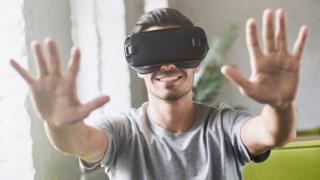Image copyright
Getty Images
Oculus has sold around half a million of its PC-tethered headsets
A software developer has tweeted about how wearing a VR headset for hours a day has damaged his eyesight.
A visit to the opticians left him “worried about my future VR use” after a doctor blamed the technology for a problem with his vision.
Glasses should correct the issue but would normally only “be prescribed to 40-year-olds”, he tweeted.
The Association of Optometrists said it had not seen evidence that VR headsets could cause permanent eye damage.
Facebook-owned Oculus states in its handbook that one in 4,000 may suffer “dizziness, seizures, eye or muscle twitching.” It recommends users suffering these symptoms discontinue using the headset and see a doctor.
Doctors have previously warned that virtual reality, which is the computer-generated simulation of a real or imaginary environment, can cause eye strain because the brain is forced to process visual stimuli in a different way to normal.
And users have complained about nausea and dizziness when using headsets, which is generally put down the the way a user perceives space around them, leading to motion sickness.
Danny Bittman, who has worked as a virtual reality developer for four years, suggested it could have affected his eyesight.
“Just had my first eye doctor visit in three years. Now I’m very worried about my future VR use. I have a new eye convergence problem that acts like dyslexia. The doc, a headset owner, is convinced my VR use caused this. He said “these glasses we usually prescribe to 40-year-olds”, he tweeted.
He went on to describe the problem: “My eyes jump when I read things like a screen or books. I’ve always had a small level of this but it’s greatly intensified now. It’s also linked to headaches and vertigo.”
He said that the issue was about “prolonged use”, and admitted that he could spend up to six hours a day wearing a headset, split into 30-minute sessions.
Ceri Smith-Jaynes, from the Association of Optometrists, told the BBC: “We currently do not have any reliable evidence that VR headsets cause permanent deterioration in eyesight in children or adults. There have been some studies looking into the effects of short-term use of VR headsets only; these did not reveal a deterioration in eyesight.
“However, some people do suffer from temporary symptoms such as nausea, dry, irritable eyes, headache or eyestrain. “
But she did have some advice about usage: “If you spend all day in VR without a break, you’ll need time to readjust to the light and the different visual environment of the real world. I would suggest taking a five-to-ten minute break each hour, using that time to move about, blink and look out of a window, or take a short walk.
“The number of hours of headset use a person can comfortably tolerate will vary depending on your binocular vision status (ask your optometrist) and the task you are doing in VR.”
VR headsets have been adapted to help improve eyesight. Start-up GiveVision created a device called SightPlus, that aims to restore vision to people whose eyesight has deteriorated beyond repair by projecting a video of the real world into the working part of the retina.
A clinical trial at Moorfields Eye Hospital suggested it improved eyesight in 59 of the 60 participants, with nearly half saying they would wear the device for watching TV, reading or going to the theatre. The firm is partnering with Sony to develop its next device.
